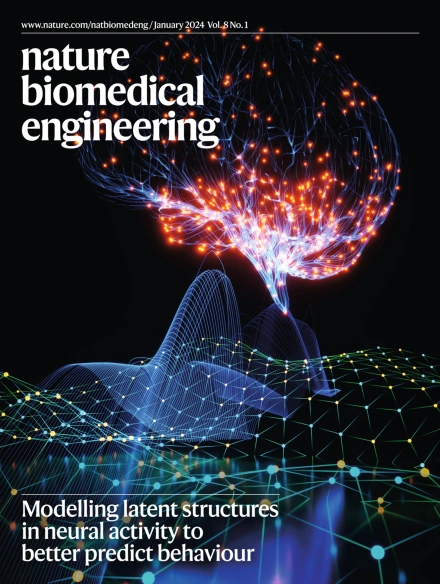Targeting overexpressed antigens in glioblastoma via CAR T cells with computationally designed high-affinity protein binders
IF 26.8
1区 医学
Q1 ENGINEERING, BIOMEDICAL
引用次数: 0
Abstract
Chimeric antigen receptor (CAR) T cells targeting receptors on tumour cells have had limited success in patients with glioblastoma. Here we report the development and therapeutic performance of CAR constructs leveraging protein binders computationally designed de novo to have high affinity for the epidermal growth factor receptor (EGFR) or the tumour-associated antigen CD276, which are overexpressed in glioblastoma. With respect to T cells with a CAR using an antibody-derived single-chain variable fragment as antigen-binding domain, the designed binders on CAR T cells promoted the proliferation of the cells, the secretion of cytotoxic cytokines and their resistance to cell exhaustion, and improved antitumour performance in vitro and in vivo. Moreover, CARs with the binders exhibited higher surface expression and greater resistance to degradation, as indicated by bulk and single-cell transcriptional profiling of the cells. The de novo design of binding domains for specific tumour antigens may potentiate the antitumour efficacy of CAR T cell therapies for other solid cancers. Computationally designed protein binders with high affinity for overexpressed antigens on tumour cells in glioblastoma enhance the antitumour activity of cytotoxic T cells with chimeric antigen receptors.


利用通过计算设计的高亲和力蛋白结合剂,通过 CAR T 细胞靶向胶质母细胞瘤中的过表达抗原
以肿瘤细胞上的受体为靶点的嵌合抗原受体(CAR)T细胞在胶质母细胞瘤患者中的疗效有限。在这里,我们报告了利用通过计算重新设计的蛋白结合体的 CAR 构建物的开发和治疗效果,这种结合体对表皮生长因子受体(EGFR)或肿瘤相关抗原 CD276 具有高亲和力,而表皮生长因子受体或肿瘤相关抗原 CD276 在胶质母细胞瘤中过度表达。对于使用抗体衍生的单链可变片段作为抗原结合域的CAR T细胞,CAR T细胞上设计的结合剂促进了细胞的增殖、细胞毒性细胞因子的分泌和细胞衰竭的抵抗力,并提高了体外和体内的抗肿瘤性能。此外,细胞的大量和单细胞转录谱分析表明,带有结合域的 CAR 具有更高的表面表达能力和更强的抗降解能力。重新设计特定肿瘤抗原的结合域可能会增强CAR T细胞疗法对其他实体瘤的抗肿瘤疗效。
本文章由计算机程序翻译,如有差异,请以英文原文为准。
求助全文
约1分钟内获得全文
求助全文
来源期刊

Nature Biomedical Engineering
Medicine-Medicine (miscellaneous)
CiteScore
45.30
自引率
1.10%
发文量
138
期刊介绍:
Nature Biomedical Engineering is an online-only monthly journal that was launched in January 2017. It aims to publish original research, reviews, and commentary focusing on applied biomedicine and health technology. The journal targets a diverse audience, including life scientists who are involved in developing experimental or computational systems and methods to enhance our understanding of human physiology. It also covers biomedical researchers and engineers who are engaged in designing or optimizing therapies, assays, devices, or procedures for diagnosing or treating diseases. Additionally, clinicians, who make use of research outputs to evaluate patient health or administer therapy in various clinical settings and healthcare contexts, are also part of the target audience.
文献相关原料
公司名称
产品信息
阿拉丁
IPTG
 求助内容:
求助内容: 应助结果提醒方式:
应助结果提醒方式:


